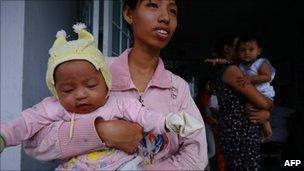World leaders meet for UN Development Goals talks
- Published

The Development Goals aim to improve global health and lift millions out of poverty
World leaders are meeting at the United Nations in New York for the second day of talks on the Millennium Development Goals (MDGs).
Iranian President Mahmoud Ahmadinejad, Zimbabwe's President Robert Mugabe and Afghan President Hamid Karzai are among those addressing the summit.
The goals, created in 2000, aim to reduce poverty and hunger, and improve health standards around the world.
UN Secretary General Ban Ki-moon has insisted the goals can be achieved.
In his opening speech on Monday to more than 140 world leaders, Mr Ban said the global economic downturn was no reason to abandon the targets and that they "should not balance budgets on the backs of the poor".
He said the MDGs had had a "transformative impact" but that there was much more to do if they were to be met by the 2015 deadline.
'Divine mindset'
Addressing the summit on Tuesday, Iran's President Ahmadinejad delivered a critique of global capitalism.
He did not mention the US or any other country by name, but blamed "the countless suffering of humanity" on "liberal capitalism and trans-national corporations".
He called for fundamental reform of the international economic and political systems to allow "just and fair governance based on a divine mindset".
Zimbabwean President Robert Mugabe told the summit that the "recent economic and financial crisis wreaked havoc on our previously confident march towards 2015".
He said despite the global slowdown and what he described as "illegal sanctions" imposed on Zimbabwe, the country had made progress towards meeting some of the MDGs.
Late on Monday, the European Union pledged 1bn euros ($1.3bn; 拢0.8bn) towards the goals.
EU Commission President Jose Manuel Barroso said the money would help the UN to "make progress on those goals we are furthest from achieving".
"We have to produce more effective results because time is running out," he said.
But the 大象传媒's Bridget Kendall at the summit says that among the pledges there have also been calls for a reassessment of the MDG strategy.
Britain's International Development Secretary Andrew Mitchell said too much time had been spent in the past "putting large amounts of aid on the table" but that the focus should now shift to what the money is achieving.
France and Spain have both repeated calls for the introduction of a global tax on financial transactions, as a way of raising the funds to finance the goals.
"We have no right to shelter behind the economic crisis as supposed grounds for doing less," said French President Nicolas Sarkozy.
"While all developed countries are in deficit, we must find new sources of financing for the struggle against poverty, for education and for the ending of the planet's big pandemics."
'Not enough'
The MDGs are intended to lift tens of millions of people out of poverty by 2015 and improve healthcare and education around the world.
The top goal - to halve the number of people living in hunger and abject poverty - is likely to be met, says our correspondent, but progress to tackle disease, illiteracy and infant mortality has been uneven.
In some places the world's poorest people have become poorer still as aid has failed to reach them, she adds.
On Tuesday, former British Prime Minister Gordon Brown said wealthier countries had not done enough to meet their commitments.
Speaking to the 大象传媒 in New York, Mr Brown said poorer countries also had a responsibility to invest more resources in education and development.
- Published21 September 2010
- Published20 September 2010
- Published20 September 2010
- Published17 September 2010